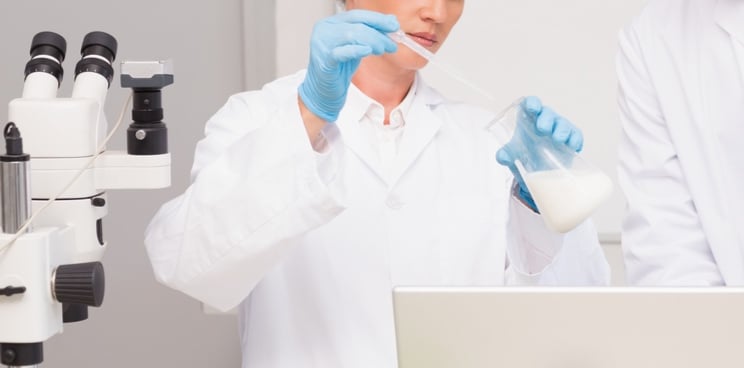Microfluidics company DigiBio and food security specialist SwissDeCode have joined forces to automate onsite milk testing and track down fraudulent adulterants such as vegetable ingredients or milk from different species.
Milk is the second most likely food at risk of adulteration after olive oil. This fraudulent practice can mislead consumers at best, and cause major health risks at worst.
“Milk adulteration is a common issue that we have come across in our interactions with the food industry during the past few years,” Brij Sahi, co-founder and CEO at SwissDeCode, told me. “In Europe, the most common forms of adulteration are dilution with water or misrepresentation of species.”
For example, goat’s milk can sometimes be mixed with cheaper cow’s milk to cut costs. Adding cane sugar, starch, sulphate salts, or urea is used to increase the fat content, while protein content can be boosted with melamine — a toxic compound that made thousands of Chinese babies ill back in 2008.
Milk manufacturers may also remove milk fat, which is sold separately to maximize profit, and compensate it by adding non-milk fat such as vegetable oil. Some European producers are concerned about the presence of potential allergens in milk such as vegetable ingredients, Sahi said.
Usually, milk is analyzed in specialized laboratories, and it can take up to seven days to return the results. This slows the release of products into the market and also makes it difficult for authorities to enforce regulations and trace adulteration.
In a project funded by the Eurostars program, DigiBio and SwissDeCode are developing an automated platform that can analyze milk directly at dairy facilities, delivering certified results without requiring technical personnel.
According to Federico Muffatto, CEO at DigiBio, his company will be using microfluidics to miniaturize and automate a DNA detection test that has been developed by SwissDeCode. The partners expect to have a prototype ready in early 2021.
With the new technology, an onsite operator will insert a milk sample into the device, which then performs a DNA assay monitored remotely by SwissDeCode experts. The analysis provides information regarding milk composition — cow, buffalo, goat, sheep — and also measures for adulterants such as soy, different kinds of wheat, rice, pea, and chickpea.
“Our rapid, onsite solution solves this problem and enables transparency in the industry,“ said Sahi. “The platform will allow companies in the dairy sector to quickly verify the authenticity of milk, by detecting, for example, undeclared milk of other species mixed in the sample tested. This will prevent delays, disruptions to the supply chain, and food recalls.“
Authorities fight an ongoing battle against food fraudsters across the world. In Europe, another example of a biotech fighting food fraud is the Italian company Fem2Ambiente, which uses DNA sequencing to detect potentially dangerous allergens such as mustard in different foods.





